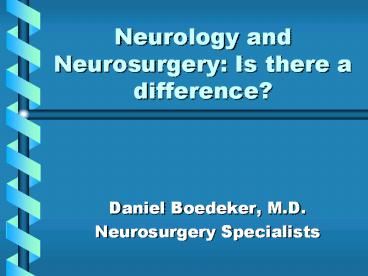Neurology%20and%20Neurosurgery:%20Is%20there%20a%20difference? - PowerPoint PPT Presentation
Title: Neurology%20and%20Neurosurgery:%20Is%20there%20a%20difference?
1
Neurology and Neurosurgery Is there a difference?
- Daniel Boedeker, M.D.
- Neurosurgery Specialists
2
Neurology or Neurosurgery
- There is a lot of confusion with whether a
patient needs a Neurologist or a Neurosurgeon,
and for good reason. - Treatment of a lot of the same body parts, issues
and symptoms. - When is a neurologist needed and when is a
neurosurgeon the one to call?
3
Neurology
- Medical doctor specializing in diagnosis and
treatment or management of certain conditions of
the brain and nervous system - May have specialized training in one area or
another
4
Neurology
- In some instances, a neurologist may take on the
role of primary care physician if a patient is in
need of continuing and extensive treatment for a
condition - Examples Parkinsons, Alzheimers, Seizure
disorder, etc.
5
Neurology
- Common ailments that lead to a neurology
consultation - Stroke
- Headaches
- Pain
- Seizures
- Brain or spinal cord injuries
6
Neurology
- Often confused with neuroSURGERY and vice versa
- Often treat similar problems and body parts
- Many patients need a neurology work up prior to
seeing a neurosurgeon depending on the diagnosis
7
Neurosurgery
- Neurosurgeons treat conditions of the brain and
spinal cord as well - Head injury
- Fracture
- Spinal cord injury
- Tumor of the brain or spine
- Aneurysm
- Bleed
8
Neurosurgery
- Neurosurgeons DO NOT treat
- headaches with no neurosurgical cause
- Vertigo
- Stroke
- Post- Concussive Syndrome
- Seizures without a neurosurgical cause
9
Examples
- Male 33 years old hit in the head on the job
- Brief loss of consciousness
- ER visit- Neurosurgeon is called
- CT is performed to assess for bleed or fracture.
CT shows a small fracture of the skull and small
intracranial hemorrhage.
10
Examples
- Patient is discharged to follow up with
neurosurgeon - Follow up CTs are performed the following visits
- After two months, the CT is normal, meaning no
bleed and no fracture - Patient calls two weeks later complaining that he
had a seizure but the CT done in the ER was
negative
11
Examples
- Who does patient need to follow up with?
- NEUROLOGY
- management of any symptoms after the accident
that are not neurosurgical
12
Examples
- Patient in MVA
- Complains of headaches
- Diagnostic testing is negative for any fractures,
bleeds or trauma - Patient needs NEUROLOGY
13
Examples
- Patient hit in the head on the job
- Wife calls us to make an appointment because he
is acting strange. - Patient needs work up by Primary Care and/or
Neurology to determine whether there is anything
Neurosurgical causing symptoms. - Only then will we need to see this patient.
14
Examples
- Patient has a seizure
- Diagnostic testing to be done to determine
whether seizure was caused by something
neurosurgical such as bleed or tumor - Seizures can be caused by a variety of factors
unrelated to neurosurgery so it is important that
patient has a full work up to determine the cause
15
Symptoms/Treatment
- Patients symptoms can many times be assessed by
a number of qualified physicians. However, unless
it is something that is NEUROSURGICAL, neurology
is the best course to take.
16
Symptoms/Treatment
- Vertigo (dizziness)
- This is many times thought to be neurosurgical
but is actually a condition treated by neurology - Involves the inner ear, sensory pathways and the
brain - No surgery or neurosurgical management involved
- NEUROLOGY
17
Symptoms/Treatment
- Headaches
- This is neurosurgical if headaches are
accompanied by a fracture, bleed, tumor or other
neurosurgical condition - Headaches can stem from several causes and are
best managed by - NEUROLOGY
18
Symptoms/Treatment
- Post- Concussive Syndrome
- We receive many requests to consult on this
diagnosis - Involves headaches and many times behavioral
changes - Treatment includes treating the symptoms
- NEUROLOGY
19
Symptoms/Treatment
- Memory Loss
- This could be caused by a number of factors
- Often after a head injury or concussion
- Treatment by NEUROLOGY
20
Neurosurgery
- We use many tests to determine whether something
is indeed neurosurgical - MRI or CT to check for fracture, bleed, tumor,
aneurysm - All are neurosurgical issues that may or may not
be able to be treated surgically
21
Neurosurgery
- Conditions that may need immediate treatment by
neurosurgery - Brain bleed/hematoma
- Tumor
- Severe herniated disk or spinal fracture
- Aneurysm
22
ANY QUESTIONS?































